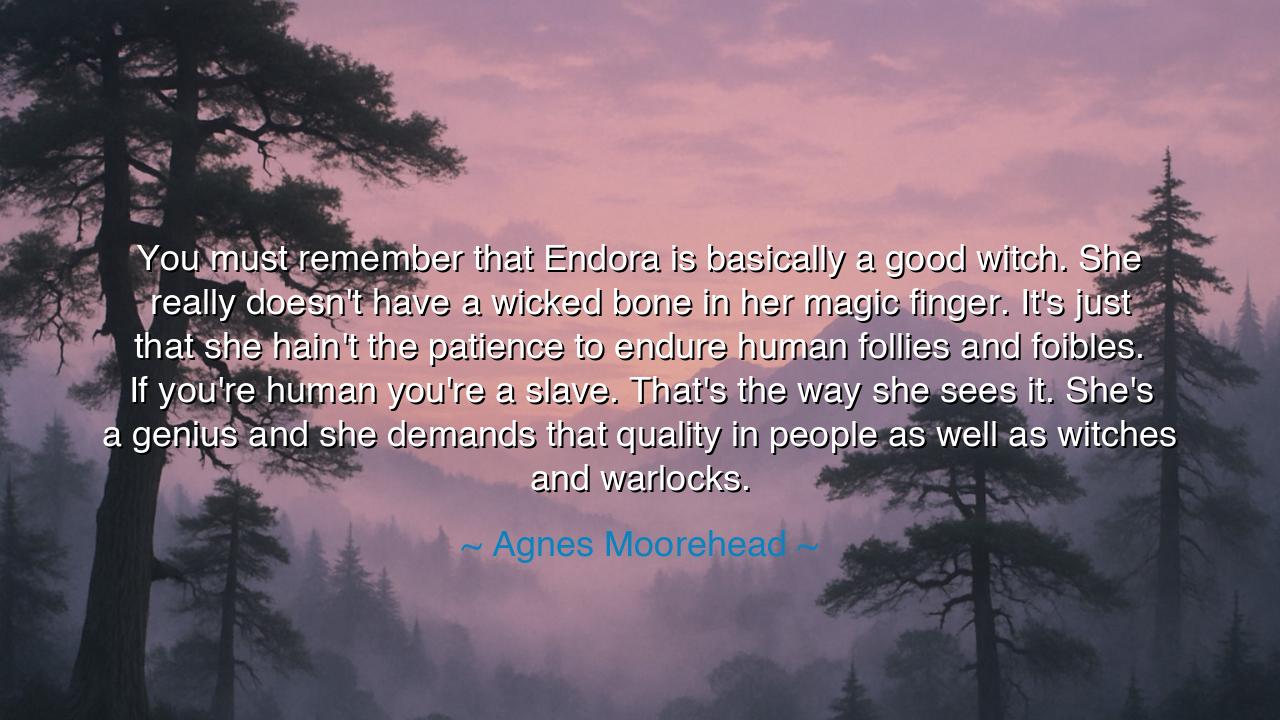
You must remember that Endora is basically a good witch. She
You must remember that Endora is basically a good witch. She really doesn't have a wicked bone in her magic finger. It's just that she hain't the patience to endure human follies and foibles. If you're human you're a slave. That's the way she sees it. She's a genius and she demands that quality in people as well as witches and warlocks.






Hear, O seekers of wisdom wrapped in story, the words of Agnes Moorehead, who gave life to the fierce and fiery Endora of Bewitched. She declared: “You must remember that Endora is basically a good witch. She really doesn't have a wicked bone in her magic finger. It's just that she hain't the patience to endure human follies and foibles. If you're human you're a slave. That's the way she sees it. She's a genius and she demands that quality in people as well as witches and warlocks.” In these words, she unveils not only the nature of a character, but a reflection of the human condition itself—the clash between the gifted spirit and the frailty of ordinary life.
For Endora, as Moorehead reminds us, is basically good. Her magic, though mighty, is not turned to cruelty or malice. Yet goodness does not mean gentleness, and kindness does not always wear a patient face. Her fault lies in her impatience—her refusal to endure the smallness of human follies and foibles, those petty weaknesses that bind mortals to cycles of error and regret. To her, these flaws are chains, proof that humans are slaves to limitation. Thus she stands aloof, demanding brilliance, scorning mediocrity, exalting only the sharp flame of genius.
This view, though severe, is not without precedent. Consider, O listener, the philosophers of ancient Athens. Socrates himself often grew impatient with the ignorance of men, mocking their empty pretenses of wisdom. He was not wicked, but relentless; he could not endure folly where truth was at stake. In the same way, Endora, as Moorehead portrays her, embodies the genius spirit—restless, uncompromising, forever demanding excellence. Such spirits elevate the world, but often struggle to live within it.
Yet history teaches that the impatient genius, though difficult, has shaped the path of humanity. Recall Leonardo da Vinci, who could not tolerate the limits of his time, always striving for what lay beyond. His contemporaries, bound to slower rhythms, thought him eccentric, even impractical. But his restless demand for genius bore fruit centuries ahead of its season. Endora, too, mirrors this archetype: the one who sees clearly the chains of mediocrity and refuses to bow to them.
Moorehead’s words also remind us that goodness can be misunderstood when joined with severity. Endora may seem cruel in her barbs and disdain, but her scorn springs not from evil, but from frustration with waste and folly. To the ordinary, her demands feel harsh; to the extraordinary, they are a call to rise higher. Thus, what some call wickedness may, in truth, be the shadow of uncompromising excellence.
What lesson, then, must we, the heirs of this reflection, take? That we must strive to balance genius with compassion, brilliance with patience. For while it is noble to demand greatness of ourselves and others, it is also human to stumble, to falter, to learn through error. The true master is not only the one who shines with genius, but the one who can bear the frailty of others with understanding. Endora’s fire inspires us to rise, but our hearts remind us to forgive.
Therefore, O seeker, let Moorehead’s words guide you: honor your genius, do not waste your gift, and do not enslave yourself to folly. But also, temper your brilliance with patience, for without it, even goodness may be mistaken for cruelty. Aspire to the fire of Endora, but hold also the gentleness that lifts others when they fall. For the greatest magic is not only in demanding excellence, but in helping others discover it within themselves.






AAdministratorAdministrator
Welcome, honored guests. Please leave a comment, we will respond soon